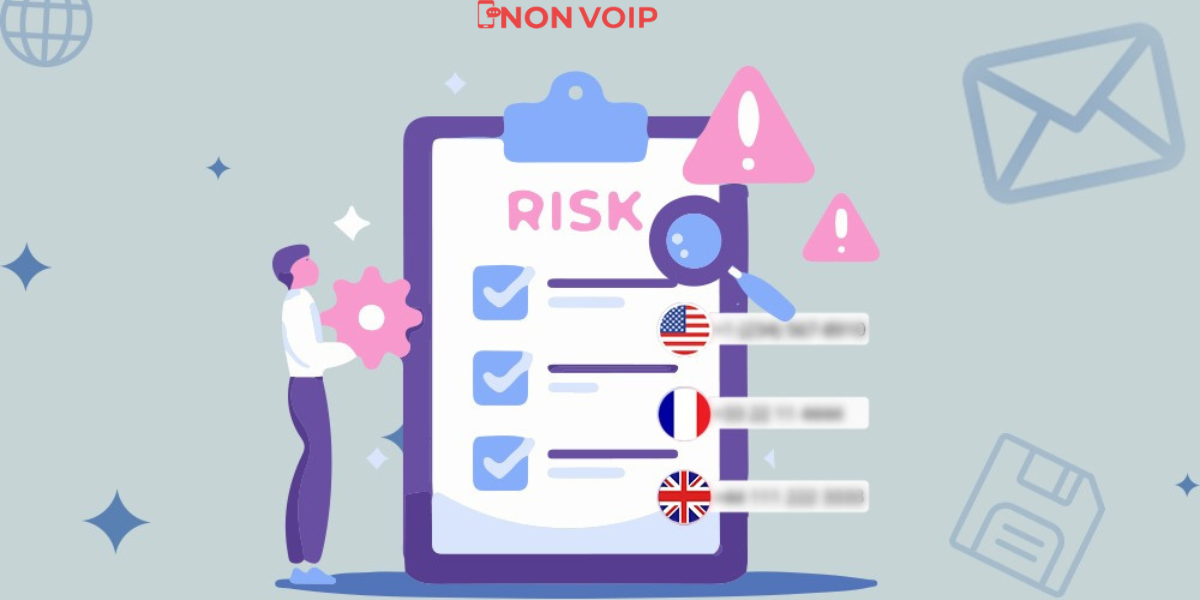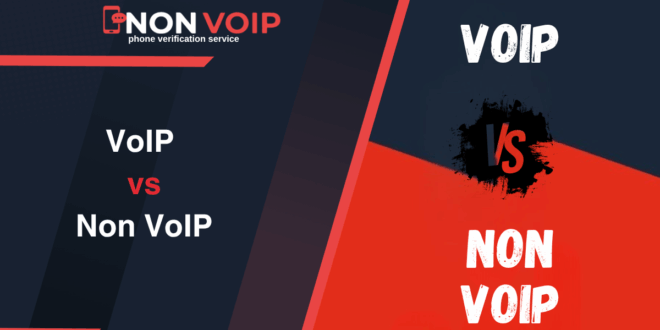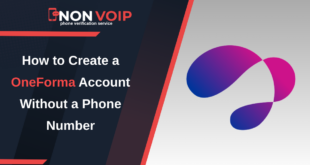A phone number might just seem like a string of digits, but if you’ve ever tried to sign up for a financial service or a work platform, you’ve likely had moments where you didn’t receive the verification code, your account was blocked, or your registration was rejected with an “unsupported number” message.
This rejection leaves many confused. Isn’t it just a number?
The answer is no. For application security systems, there is a crucial difference between two types of numbers: Non-VoIP and VoIP.
Understanding VoIP vs Non VoIP numbers isn’t just technical trivia; it’s essential for protecting your data and ensuring you can access the services you need.
What is a Non VoIP Number?

Simply put, these are real phone numbers. A Non-VoIP number is what you get directly from a telecommunications company when you buy a SIM card (or eSIM).
It’s called “Non-VoIP” (Not Voice over Internet Protocol) because it operates over traditional cellular networks, not over your internet connection.
Features
- High Reliability: It’s considered more trustworthy for purposes that require identity verification, especially for banking, government platforms, and other sensitive services.
- Security: Because it’s tied to a real identity and a physical SIM card, it proves possession of a specific device, making it the gold standard for security verification and difficult to spoof or use for fraud.
- Wide Acceptance: It is overwhelmingly accepted by services and platforms that reject virtual or VoIP numbers.
Drawbacks
- Less Flexible: It’s usually tied to a single device (your phone) and a specific geographic location.
- Cost: It’s often more expensive, especially if it requires purchasing an active SIM card.
- Limited Features: It’s generally limited to basic voice calls and text messages.
Uses
A Non-VoIP number is used anywhere that requires real proof of identity:
- Verifying bank accounts and e-wallets (PayPal).
- Activating social apps tied to identity (WhatsApp, Tinder).
- Registering for government services.
- Major freelance platforms that pay money (Remotasks, WeLocalize).
What is a VoIP Number?

This is a virtual phone number that uses “Voice over Internet Protocol” (VoIP) technology, which allows you to make and receive calls over the internet instead of traditional phone networks.
You don’t get this number from a telecom company; you get it from an app or an online service.
Features
- Flexibility: You can use it from any device (computer, phone, tablet) and from anywhere in the world, as long as you have an internet connection.
- Low Cost: It’s often free or very low-cost, especially for international calls.
- Advanced Capabilities: It includes advanced features like video calls, call forwarding, and voicemail-to-email.
Drawbacks
- Lack of Trust (Verification Problem): This is its core drawback. It is easily rejected by services that require a traditional SIM card.
- Internet Dependency: Call quality and message delivery speed depend entirely on the stability of your internet connection.
- Security and Privacy: It offers no real protection against security fraud as it’s not tied to a physical SIM card, making it vulnerable to hacking and viruses.
Uses
VoIP numbers are excellent in situations that do not require identity verification:
- Making calls from any internet-connected location.
- Customer support and call centers, to easily manage calls from different locations.
- Making low-cost international calls.
- Having an extra business number on the same phone.
VoIP vs Non VoIP Numbers

Here is the VoIP vs Non VoIP numbers in a simple, brief format:
This is where many people get confused. The difference between a virtual number and a VoIP number is simple:
- Virtual Number is a general marketing term that means “a phone number you get online.“
- VoIP is the technology that most of these virtual numbers use to function.
Therefore, in 99% of cases, when you buy a cheap virtual number, you are buying a VoIP number. This is why when platforms block “virtual numbers,” they mean they are blocking VoIP technology.
Why Do Sites Reject VoIP Numbers?
There are several reasons why sites reject VoIP numbers:
- Ease of Fraud and Anonymity: Because VoIP numbers are cheap and easy to create, anyone can generate dozens of them in minutes. This makes them the preferred tool for scammers to create fake accounts.
- Faking Geographic Location: Many services require a user to be in a specific country. Anyone in the world can get a US-based VoIP number, so the platform cannot trust it as proof of location.
- High Rejection Rate: Because of these risks, 70% to 80% of major platforms (like Google, Telegram, and financial services) block VoIP numbers completely.
Are Virtual Numbers Safe?

When we ask if virtual numbers are safe, the answer is often no, specifically because of the widespread problem of number recycling.
Cheap or free services constantly recycle numbers. This means the number you get today might have been used by someone else last week, and it might already be blacklisted.
Or worse, it could be used to steal your account in the future when it’s given to someone else.
So what’s the solution? VoIP numbers aren’t safe and don’t meet the requirements, but it’s not easy to get a new SIM card every time you need a Non VoIP number!
This is where specialized services that understand this crucial difference come in. Instead of selling you a VoIP number (which will be rejected and put you at risk), platforms like Non-VoIP provide a solution that combines both.
Non-VoIP don’t sell you a virtual number; they grant you safe, temporary access to a real number (tied to a physical SIM card) that is clean (not recycled) and has the same level of trust that banks and major platforms demand.
You use this real number just once to receive your verification code, guaranteeing you provide the platform with exactly what it needs.
Conclusion
In the end, it all depends on your needs.
If you want a flexible secondary number for international calls or for your business, a VoIP number might be a good solution.
But if you want to activate an account on a banking platform, a social app, or an important work platform, Non-VoIP number is your best option to guarantee acceptance and security.
 Blog Non-VoIP
Blog Non-VoIP




